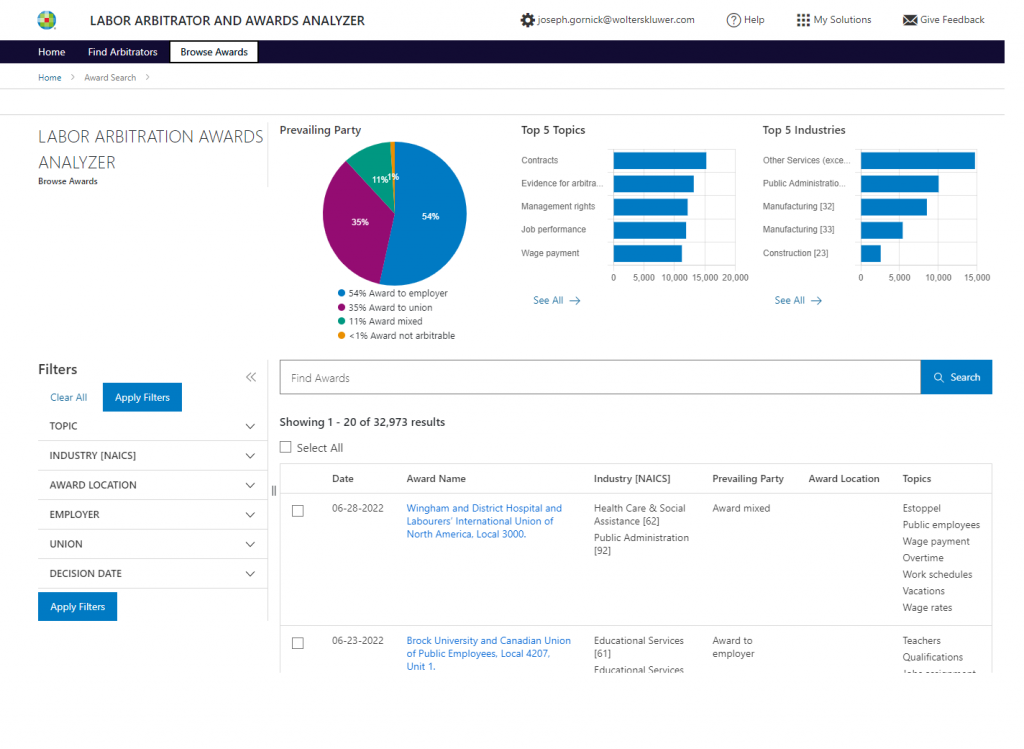[ad_1]
While recent years have brought a number of products to market for analyzing judges and their rulings, little is available for analyzing private arbitrators, and particularly arbitrators in labor and employment matters.
A new tool introduced today takes a major step towards remedying that. Called Labor Arbitrator and Awards Analyzer, it is part of the Labor Arbitration section of the legal research platform VitalLaw from Wolters Kluwer Legal & Regulatory U.S.
It provides research and data visualization tools on more than 33,000 labor arbitration awards and profiles of the arbitrators who issued those awards to provide users with insights on cases by topics, industries, outcomes and more.
The tool provides two features: Find Arbitrators and Browse Awards.
The Find Arbitrators feature (see featured image above) enables users to search for arbitrators by various criteria — most notably by the topics and industries with which they have experience and the most-common prevailing party. For example, if you want to find an arbitrator with experience in cases involving drug testing in the manufacturing industry, these filters enable you to do that.
Arbitrators can also be filtered by whether they have experience with a particular employer or union, by their location, or by the award location.
When you identify a specific arbitrator to view, the profile shows the same information about that arbitrator, so the user can see a quick snapshot of how the arbitrator decides cases. The user can see, for example, whether the arbitrator tends to decide cases more often for management or unions and the topics and industries the arbitrator has dealt with. The user can also then read the arbitrator’s opinions.

The Browse Awards feature provides the same set of filters for finding arbitration awards. As you apply filters and narrow results, you can view the full awards that match your criteria.
The tool allows users to create reports of their research into arbitrators, allowing them to compile the information in a PDF and send it to a colleague or client.
Note that no collection of labor arbitration awards is comprehensive. Awards are typically considered confidential among the parties and the arbitrator and are made public only when the parties agree, and then only with a number of redactions.
This tool is based on WK’s own collection of labor arbitration awards that it has been collecting for many years through relationships with labor arbitrators and parties to labor arbitrations.
Why This Is Useful
The method by which the parties to a labor dispute select an arbitrator may vary according to the arbitration panel they use or the terms of their collective bargaining agreement.
However, a typical scenario is that the arbitration panel sends the parties a list of arbitrators, and the parties then strike or number names, with the panel appointing an arbitrator from the names remaining on the list.
Often, however, the parties may know little about the arbitrators on the list and have no quick or easy way to research them.
This strikes me as the top use case for this new tool, allowing a party to quickly learn more about the potential arbitrators and make a more informed selection.
Of course, once the arbitrator is appointed, the tool provides the ability to further research that arbitrator and the arbitrator’s awards.
For these reasons, this should be a welcome addition to the research toolset of attorneys who practice labor and employment law.
[ad_2]




